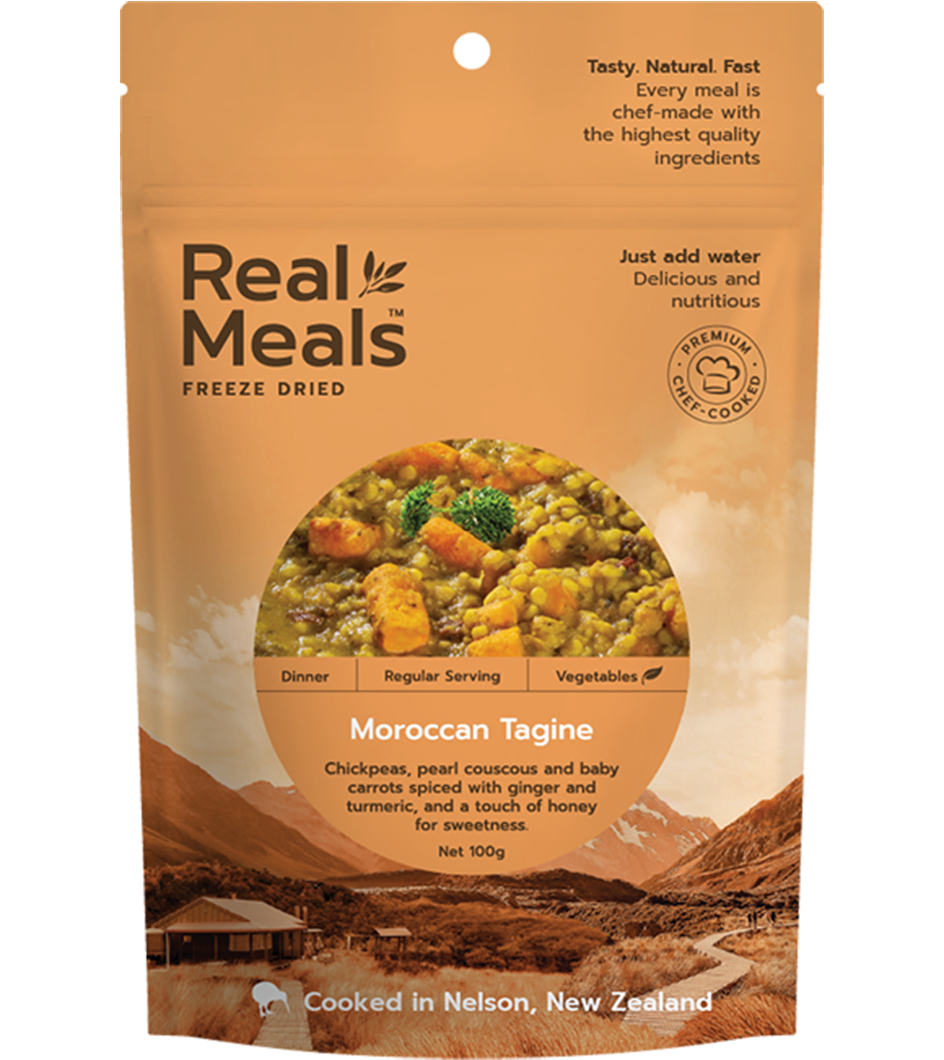
Real Meals Freeze Dried
20/06/2022
I've never been a fan of 'dehy', generally speaking. I am definitely not a food snob, or even a 'foodie', I am pretty functional about nutrition to get the job done. However, there is a line many dehydrated backcountry meals cross where texture and colour become vague and indistinct to the point where I find them unappealing. When something says on the pack that it is some kind of generic 'beef curry', but is in actuality of eating experience some kind of grey paste with a bit of spice thrown in, it's not something I look forward to eating after a long day of high energy output. About the best thing I can say about dehy is that it is light and eaten straight from a foil pouch so you don't have to look at it. Nevertheless, they get the job done when weight is critical. When weight is less critical, I'll definitely prefer to carry three times the weight with instant rice and boil in a bag curry, such as that made by MTR. Or even better, actual food in its raw form!
Fortunately for us all, there is more competition in the backcountry food market than ever, resulting in a rise of choice and quality. Real Meals are a company based out of Nelson, formerly known as Absolute Wilderness. The company is owned by outdoor enthusiasts Nathan Fa'avae, Cameron Lawes and Gilbert Robertson. Between the three of them, their interests run the gamut from adventure racing to mountaineering and hunting—pretty much the whole market. Fa'avae's name in particular carries a lot of credibility, his record in some of the toughest adventure races on the planet speaks for itself and there's no way you can have that type of success in gruelling, long-form racing with having your nutrition system absolutely dialled in. With his backing, you can be assured that the nutritional side of Real Meals food has been well-considered.
The meals are, according to Real Meals' website, cooked from scratch and then freeze dried, retaining 90% of their nutritional value at only 20% of the weight. They make a point of saying their meals are not assembled from pre-dried ingredients, though I have no idea if their competitors do this or not. All their meals can, at a pinch, be rehydrated with cold water. While this isn't recommended for best enjoyment, it is good to know in an emergency situation (have you ever tried to rehydrate dried pasta without a working stove? It doesn't go well).
But on to the most important aspect, do they taste good and avoid the 'dehy homogenous paste' scenario described above? To date, I've tried the Moroccan Tagine and Dal Makhani flavours and can report they certainly taste 'real'. The coucous in the tagine actually retained the texture of (large gauge) coucous, unlike the 'pasta' I've had in other dehy meals that is the same slushy texture as the sauce. Having some textural variation in the meals goes a long way to giving the impression they are in fact made of separate ingredients, rather than just being some kind of synthesised utilitarian space goo. Some people won't care about this aspect, but if this resonates with you, then these are worth a try if you've given up on dehy as a category. Having said that, these meals are still recognisable as freeze dried, there's no getting around the effect that process has on the food, even once reconstituted.
I haven't tried Radix's dehy meals, which seem very popular in the climbing community these days, but I would certainly choose Real Meals products again over those of the more-established brand you probably find in your supermarket—if weight is crucial. If weight isn't the factor of absolute priority, I'd still prefer to carry a boil in the bag meal solution from a company like Go Native, it is just closer to the comforting and nourishing experience of real food.
Everyone has personal preferences and tastes when it comes to backcountry food; I've known some people to quite happily chow down on freeze-dried meals day after day at a hut that you can drive to. Most experienced backcountry types will have found a nutrition system they adhere to and are happy with, but if the nutrition/weight side of your food in the backcountry is a problem you don't have a happy solution to yet, I'd recommend trying out some of the available options from Real Meals and see if they work for you.
